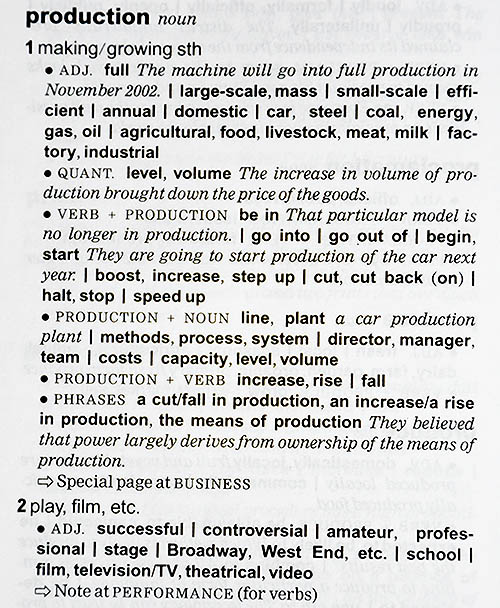A collocation is a combination of words that is natural to native speakers. In English the combination fast food is natural; *quick food does not sound right. In the same way, we say a quick meal and not *a fast meal (for the use of the asterisk, read at the end of this text).
There are many possible types of collocations, such as noun + verb, verb + noun, verb + adverb, adjective + noun etc.
Some examples:
A broad overview (adjective + noun)
Carefully examine (adverb + verb)
A wedding reception (noun + noun)
The companies merged (noun + verb)
Fully aware (adverb + adjective)
Whisper softly (verb + adverb)
Many collocations are combined with verbs:
We say make a mistake and do business, not *do a mistake and *make business.
Here are some examples of other collocations with verbs:
Take a look, take notes, take a seat
Keep calm, keep in touch, keep a promise
Get ready, get lost, get the message
Come back, come into view, come to a decision
Go swimming, go abroad, go bankrupt
Catch a bus, catch a cold, catch fire
Run a factory, run wild, run up a debt
Set up an agency, set an example, set the table
Launch a product, launch an offensive, launch into an attack
Pay attention, pay tribute, pay a visit
Break the ice, break into tears, break even
Have lunch, have a rest, have a surprise
Some printed dictionaries of collocations:
Cambridge English Collocations in Use
Longman Collocations Dictionary and Thesaurus
LTP Dictionary of Selected Collocations
Macmillan Collocations Dictionary
Oxford Collocations Dictionary
The BBI Combinatory Dictionary of English
You can get these from your bookshop or, e.g., Amazon, Bokus or Adlibris.
Online you can find these:
freecollocation.com
ozdic.com
wordreference.com
sketchengine.eu
The following is an entry in Oxford Collocations Dictionary. It shows you what adjectives, verbs and nouns go with the word production and gives examples of phrases.

When you are not sure of which words go well together, check a collocations dictionary. It will help you write more accurate English and it will help you vary your language.
You can find a comparison between different types of dictionaries here.

Recent Comments